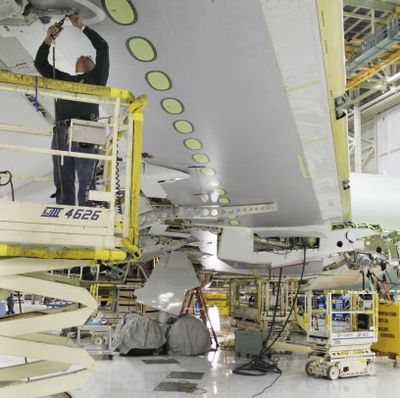Inslee vetoes manufacturers’ tax break connected to budget

OLYMPIA – Manufacturers in Washington shouldn’t start making plans to spend the money they will save on lower business taxes the Legislature approved last week in the late-night scramble to pass a budget.
Gov. Jay Inslee took that tax break out of a package of incentives Friday through a line-item veto, contending it was unfair to other taxpayers and lacked accountability.
After several days of celebrating a bipartisan effort to pass a $43.7 billion operating budget, a major revision in school policy and the many bills tied to those two accomplishments, Inslee set up a possible showdown with Senate Republicans who said the tax break would help bring manufacturing jobs back to the state.
Senate Ways and Means Committee Chairman John Braun, R-Centralia, said he was frustrated and disappointed after months of working on the budget, and accused Inslee of going back on the budget deal. He also hinted of a possible veto override, noting the bill that included the tax break for manufacturers passed both chambers with bipartisan super majorities.
“I felt we were going out of our way to include the governor,” Braun said. Members of the governor’s staff were involved in negotiations during the week leading up to the deal and no one raised objections to the lower rate for manufacturers, he added.
If there were objections, they should have said so, the Senate budget chief said. “We can’t read their minds.”
Inslee approached it from the other direction, saying no one asked for any assurance that the tax break would be signed, and none was given. In some cases, lawmakers have sought assurance that a compromise they are suggesting will be signed, and he’s said yes to some and no to others.
This is a consequence of putting together a budget with the clock ticking down to a government shutdown and passing legislation in the middle of the night, he added.
“If their tender feelings were injured to some degree, take a look in the mirror,” he said.
The bill had a total of 13 business-oriented tax breaks, and Inslee signed most of them into law, including a 10-year extension of the tax credit for film productions in Washington that the producers of the “Z Nation” series said was needed to continue production in Spokane next year.
But Inslee used the veto pen to knock out two. One was a sales tax exemption to encourage a coal-fired power plant in Centralia to switch from coal to natural gas or bio mass. The law already requires the company to do that, he said.
The more far-reaching tax break involved the business and occupation tax rate on manufacturing companies, which varies widely between different types of products. The Boeing Co. and other aerospace manufacturers have the state’s lowest rate, in part because of special agreements the state has with Boeing to keep or expand production in Washington.
Other manufacturing businesses pay a tax on their gross receipts as much as 66 percent higher than Boeing. The proposal would have lowered the B&O rate for all manufacturers to the Boeing rate of .2904 percent.
The Department of Revenue estimated it would reduce the overall amount the state collects from manufacturers by $86 million over the next six years.
Braun released figures from the state Employment Security Department showing that while jobs in other sectors have grown since 2000, manufacturing has dropped about 51,000 in 17 years, figures from the Employment Security Department show.
The tax change would help jobs all over the state, Braun said. It could also help Boeing in an unfair trade complaint before the World Trade Organization because it would no longer have a preferential tax rate.
Inslee said the other tax incentives in the portions of the bill he signed into law are subject to review, and expire after a certain time if they aren’t renewed. The tax reduction for manufacturers did not.
Although the Legislature passed the 2017-19 operating budget and bills connected to it in a marathon session on June 30 and July 1, it technically remains in its third special session. Most lawmakers, however, have returned home.
That means a veto override attempt is possible by July 20 if legislative leaders decide to bring members back. That’s expected if negotiators reach a deal on a two-year capital budget with some $4 billion in new state construction projects and a possible change in state water law to address a Washington Supreme Court issue that is affecting development in rural and suburban areas.
But Inslee’s veto of the tax breaks may have damaged any deal that could be reached on the capital budget and a water rights agreement, Braun said.
“I expect we will try” a veto override, he said. “I’m not sure how. It gets complicated from here.”